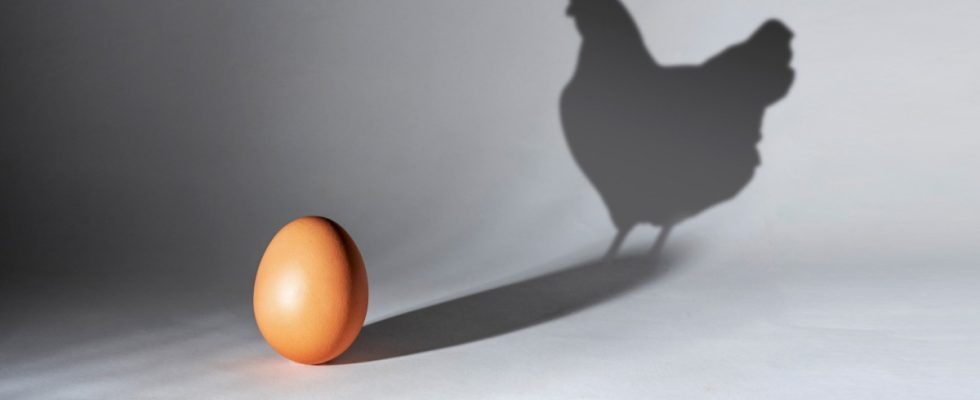What came first, chicken or egg? That’s a question that science is having a surprisingly difficult time with, there’s a stalemate. Chicken and egg are mutually dependent, one cannot exist without the other. What should a hen hatch from if not from an egg? And conversely, who should lay an egg if not a hen?
Chicken or egg, that’s a passionate argument. Some people still make it easy for themselves with the answer. Eggs are evolutionarily older than today’s chickens, even dinosaurs laid eggs, so the egg was of course there first. But that’s not a solution, because the problem is only postponed, and the new question is just as tricky as the old one: Which came first, dinosaur or egg?
Others stay with the chicken egg, but drift off into the philosophical. The world’s first hen must therefore have hatched from an egg laid by an animal that by definition could not have been a hen. But that doesn’t get us anywhere either. Because this egg was there first, but it wasn’t laid by a hen, so strictly speaking it wasn’t a real hen’s egg. Does an egg belong more to the chick or more to the mother? And there it is again, the stalemate.
“The earliest reptiles gave birth to live young”
Geoscientists from Nanjing in China and Bristol in England are now starting earlier. Because so far, one thing has always been assumed: namely, that egg-laying beings hatch from eggs themselves. The researchers led by Baoyu Jiang are now questioning this connection. They scanned the fossils and analyzed the genes of 51 extinct and 29 extant animal species that give birth or have given birth to their offspring, some in hard-shelled eggs, some alive. Like the scientists in the magazine Nature Ecology & Evolution to report, reproduction is more flexible than expected. In many animal species, phases in which they lay eggs alternate with phases in which they give birth to their offspring alive. Second, the earliest reptiles, birds, and mammals gave birth to live young.
So the great-great-great-ancestors of today’s hens didn’t lay eggs. This gives the chicken-egg problem another solution variant. And the researchers break with a common assumption about evolution. Eggs have so far been considered the key to the success of reptiles, birds and mammals. They all go back evolutionarily to a common ancestral species that once found a way, unlike fish and amphibians, to reproduce without water. So far, the assumption has been that they succeeded in taking this step thanks to hard-shelled eggs that replaced spawning ponds. Only later did some of them switch to live births. But according to the new study, that’s not true. Another achievement was decisive for the shore leave: the ability to delay the birth until favorable environmental conditions prevailed for the offspring. And not the egg.
This may not convince chicken-and-egg purists, but it definitely wasn’t an egg in the beginning. However, strictly speaking, there was no hen at the beginning. The answer to the chicken-and-egg problem is therefore most likely a neither-nor.

